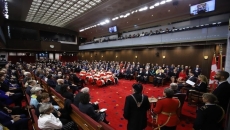The federal government ran a deficit of $148.6 billion during the first four months of its 2020-2021 fiscal year, the result of unprecedented spending in response to the COVID-19 pandemic.
The result compared with a deficit of $1.6 billion for the same period in the 2019-2020 fiscal year.
In its monthly fiscal monitor, the Finance Department says program expenses for the four-month period of April to July hit $215.7 billion, up $111.1 billion, or 106.2 per cent, from the same period a year earlier.
Major transfers to persons — which consists this fiscal year of seniors benefits, employment insurance payments, the Canada Emergency Response Benefit, and children's benefits — increased by 170.8 per cent year-over-year, hitting almost $87.3 billion.
About $50.4 billion of the overall increase of $55.1 billion from the same period the year before was related to the Canada Emergency Response Benefit, which starts to expire this weekend.
Also adding to spending costs was the government's wage subsidy program, which the fiscal monitor says cost almost $30.6 billion over four months.
Revenues for the period totalled just over $73.9 billion, down $38.3 billion or 34.1 per cent compared with the same period last year, mainly a result of measures such as the enhanced GST credit and tax deferrals.
Public debt charges decreased by about $2.4 billion, or 25.7 per cent, to $6.8 billion from $9.2 billion, largely reflecting lower consumer price index adjustments on real return bonds.
In July, the Liberals projected a historic deficit of $343.2 billion for this fiscal year. The Finance Department says the figures through the same month remain consistent with that estimate.
The deficit estimate doesn't include the cost of a suite of new benefits to replace the expiring CERB, which the Liberals previously estimated to cost $37 billion, or any of the sweeping promises announced in this week's throne speech.
Private sector economists have estimated the promised new spending, combined with program spending to date, could push the federal deficit to as high as $400 billion.






